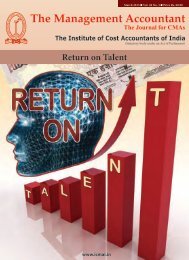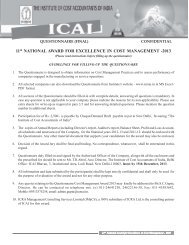This Issue - Icwai
This Issue - Icwai
This Issue - Icwai
You also want an ePaper? Increase the reach of your titles
YUMPU automatically turns print PDFs into web optimized ePapers that Google loves.
LEGAL LEGAL EDUCATION<br />
EDUCATION<br />
based on a set of agreed criteria to assess the standard<br />
of all institutions teaching law—as a mechanism to<br />
ensure consistent academic quality throughout the<br />
country.<br />
Curriculum Development<br />
The development of contemporary curriculum,<br />
which is integrated with other disciplines and also<br />
ensures regular feedback from stakeholders.<br />
Autonomy may be granted to universities, national<br />
law schools (NLSUs) and other law schools to decide<br />
the core and optional courses to be offered.<br />
Examination System<br />
Revising the prevailing examination systems and<br />
suggest the development of evaluation methods that<br />
test critical reasoning by encouraging essential<br />
analytical, writing and communication skills. The<br />
end-semester examination should be problemoriented,<br />
combining theoretical and problem-oriented<br />
approaches rather than merely test memory. Project<br />
papers, project and subject viva, along with an endsemester<br />
examination to be considered as pedagogic<br />
methods imperative for improving quality.<br />
Measures to attract and retain talented faculty<br />
To attract and retain talented faculty, the Commission<br />
recommended better incentives, including<br />
improving remuneration and service conditions.<br />
Developing a Research Tradition in law schools<br />
and universities<br />
The Commission has emphasized that the need for<br />
creating a tradition of research in law schools and<br />
universities is imperative, if India has to transform<br />
itself from being only a consumer of available legal<br />
knowledge to being a leading producer in the world<br />
of new legal knowledge and ideas.<br />
Centers for Advanced Legal Studies and<br />
Research (CALSAR)<br />
The Commission also stated that there is need to<br />
set up four autonomous, well networked Centers for<br />
Advanced Legal Studies and Research (CALSAR), one<br />
in each region, to carry out cutting edge research on<br />
various aspects of law and also serve as a think-tank<br />
for advising the government in national and<br />
international fora.<br />
Financing of legal education<br />
It is for law schools and universities to decide the<br />
level of fees, but as a norm, fees should meet at least<br />
20% of the total expenditure in universities. <strong>This</strong><br />
should be subject to two conditions : first, needy<br />
students should be provided with a fee waiver plus<br />
scholarships to meet their costs; second, universities<br />
should not be penalized by the UGC for the resources<br />
raised from higher fees through matching deductions<br />
from their grants-in aid.<br />
Dimensions of Internationalization<br />
Building world class law schools today will require<br />
creatively responding to the growing international<br />
dimensions of legal education and of the legal<br />
profession, where it is becoming increasingly<br />
necessary to incorporate international and comparative<br />
perspectives, along with necessary understanding<br />
of domestic law. Suggested initiatives to promote such<br />
international perspectives include building collaborations<br />
and partnerships with noted foreign universities<br />
for award of joint/dual degrees; finding ways of<br />
evolving transnational curricula to be taught jointly<br />
by a global faculty through video conferencing and<br />
internet modes; as well as creating international<br />
faculty, international courses, and international<br />
exchange opportunities among students.<br />
Technology for dissemination of Legal Knowledge<br />
For maximum dissemination of legal knowledge,<br />
the commission recommended that all information<br />
available in the Indian Law Institute (“ILI”), Supreme<br />
Court Library, Indian Society for International Law<br />
(“ISIL”) as well as those of all law schools, universities<br />
and public institutions in the country, be networked<br />
and digitized. Such networking is in addition to the<br />
need for adequate infrastructure such as computers,<br />
law journals, legal databases and excellent libraries<br />
in the institutions teaching law.<br />
(d) The Vision Statement 2010-2012 of the Bar<br />
Council of India, (June 2010)<br />
The Vision Statement recognised the need to<br />
address various issues as well as the several different<br />
constituents of the legal profession in India and<br />
identified some areas such as —<br />
1. Inadequate quality of legal education and<br />
infrastructure, and<br />
2. Lack of relevant skills training to meet with the<br />
ever-changing demands of the modern world,<br />
as two of the issues affecting the image of the<br />
legal profession in India.<br />
One of the steps identified in the Vision Statement<br />
towards resolving these issues is creating clear quality<br />
standards for legal education and a common entry<br />
level standard for entering law schools across the<br />
country. In furtherance of the objective of improving<br />
the standards of legal education and the modernisation<br />
of the legal profession in the country stated in<br />
the Vision Statement, the Bar Council of India intends<br />
to implement a series of measures this year, which<br />
law schools across India must put in place by the<br />
Academic Year 2011-2012.<br />
As the things stands now, the issue as to passing<br />
the All-India Bar Examination which is mandatory<br />
for commencement of practice as advocate in court,<br />
has been challenged in writ petitions in nine High<br />
Courts, including Madras, Bombay, Punjab and<br />
Haryana, and Gujarat; and the matter came up before<br />
the apex court during 1 st week of August 2010. The<br />
The Management Accountant |September 2011 795




